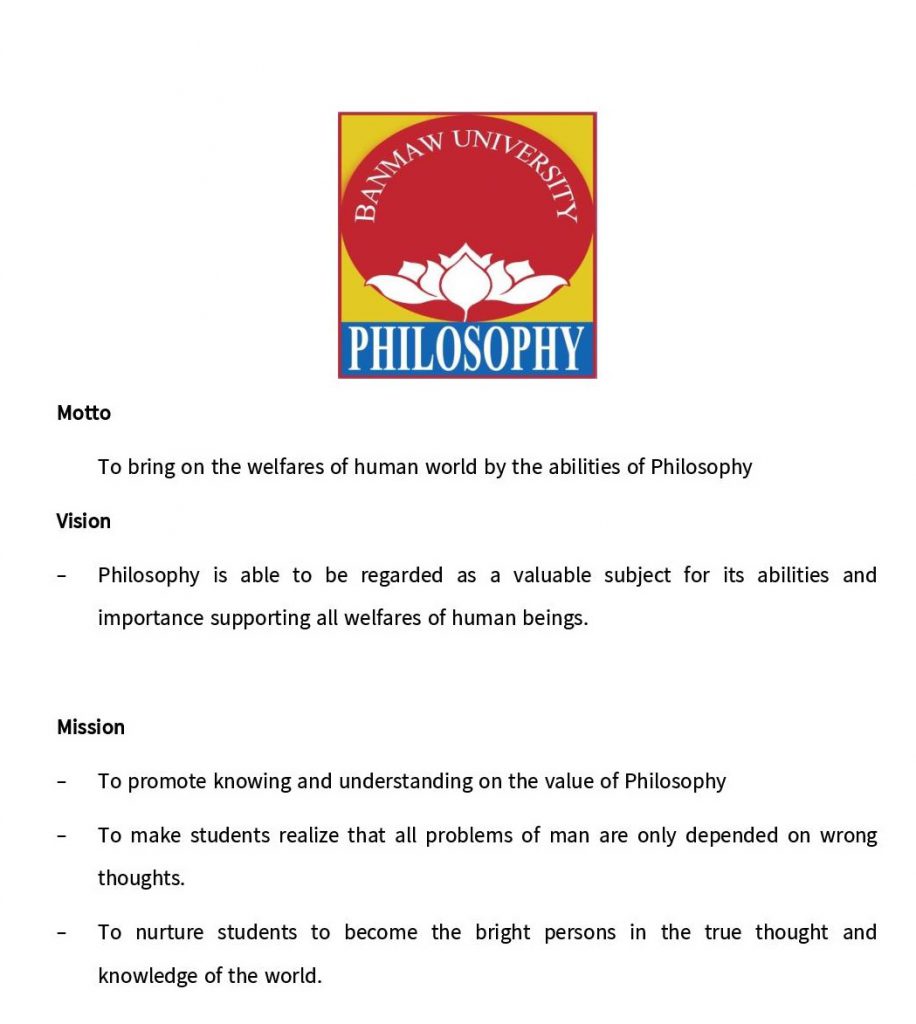
| No | Name | Rank | Photo | |
|---|---|---|---|---|
| 1 | Dr. Myint Ngwe | Professor & Head | myintngwe@bmwuni.edu.mm | 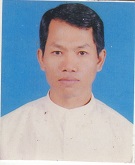 |
| 2 | Dr. Khin May Oo | Professor | kmayoo@bmwuni.edu.mm | 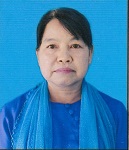 |
| 3. | Dr. Khin Nu Swe | Associate Professor | Khinnuswe@bmwuni.edu.mm |  |
| 4. | Daw Sau Zung Htang | Lecturer | zonehtant@bmwuni.edu.mm | 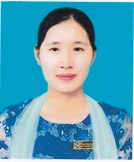 |
| 5. | Daw Nway Nway Aung | Assistant Lecturer | nwaynway@bmwuni.edu.mm |  |
| 6. | Daw Htwe Tin | Assistant Lecturer | htwetin@bmwuni.edu.mm | 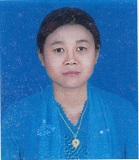 |
| 7. | Daw Seng Pan | Tutor | sengpan@bmwuni.edu.mm |  |
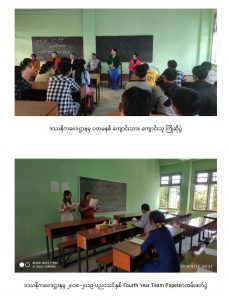
| No | AUTHOR | Research Name | Abstract | Journal Name, Vol.No, Date | ||
|---|---|---|---|---|---|---|
| 1 | ဒေါက်တာမြင့်ငွေ | A Study of Some Philosopher's Views on the Concept of Freedom | Thought concerning the will of freedom of all human is one of the most thought all person seriously think. It is also one of all men's basic need and attachment. Some philosophers' definitions of the concept of freedom are different depending on the separate fields such as religion, politics, social, education, economics, culture and so on. Some philosophers think that there are positive freedom and negativefreedom. The concepts of freedom and determinism as well as the concepts of freedom and responsibility are always together. | Banmaw University Research Journal, 2016 August, Vol.6 (Pg 34-43) | ||
| 2 | ဒေါက်တာမြင့်ငွေ | The Role of True Knowledge Approaching to the Problems ofHuman Beings | The purpose of this paper if to show how much important true knowledge is for the whole problems of all human beings. The comparative method, descriptive method and evaluative method will be used to solve and evaluate the problem of true knowledge occuring in man's daily life and social life. The intention of this paper is to contribute and consider the importance of true knowledge for the development and peace of human societies. | Banmaw University Research Journal, 2017 June, Vol.7 (Pg 15-24) | ||
| 3 | ဒေါက်တာခင်မေဦး | A Study of Nishida's Conception of Self-Awakening | This paper intends to dhow the idea of self-awaking in Nishida's philosophy. Nishida was a Japanese prominent thinker in the modern age. His conception of self-awakening in one of the remarkable systems of Japanese philosophy and related with rapidly development of Japan after world war II. | Mohnyin Degree Collge Research Journal, 2010 December, Vol.2, No.1 (Pg 9-15) | ||
| 4 | ဒေါက်တာခင်မေဦး | A STUDY OF PLATO'S FOUR CARDINAL | Plato's moral philosophy is one of the important theories of Greek virtue ethics. Virtue ethics is emphasized on the good character trait of man than moral rules, consequences and duty. Many moral philosophers defined good moral character trait from their perspectives. According to Plato, wisdom, courage, self-control and justice are good character traits. To be a virtues person one must have these character traits. These character traits are called moral virtues. The problem of this paper is whether Plato's moral virtues are essential, fundamental and applicable but not sufficient in recent society. The methods used in this paper are descriptive method and evaluative method. Plato's doctrine of cardinal virtues with slight variations can be accepted and applicable for present society. But new virtues are needed to have. | Myitkyina University Research Journal, 2017 December, Vol.8, No.1(Pg 61-75) | ||
| 5 | ဒေါက်တာခင်မေဦး | A Critical Study of Carvaka's Philosophy | This paper is an attempt to reveal the fundamental principles of Carvakas. The problem of this paper is to solve that can the extreme materialistic view sufficient to solve the problems of human existence? Carvakasschool have been discussed metaphysics, epistemology, ethics and other fields in their philosophy. The whole outlooks are based on their theory of knowledge. Their theory of knowledge only recognized on sense experiences as the sources of knowledge. They did not accept the other unseen realities. This paper will contribute to those who search for the truth and the meaning of life. | Kyaing Tong University Research Journal, 2019 August, Vol.10, No.1(Pg 129-131) | ||
| 6 | ဒေါက်တာခင်မေဦး | Hedonistic Theory in Western Ethics | This paper is an attempt to show hedonist theory. Hedonism is one of the oldest and well-known ethical theories in the west. It holds that pleasure or happiness is the chief good in life. It begins during the early Greek period. It becomes theory of utility by the efforts of Jeremy Bentham and John Stuart Mill. The motto of this theory is that the greatest happiness of the greatest numbers. This theory is combination of psychology and ethics. The research question of this paper is that "Can it be said that hedonistic doctrine is sufficient to build a happy life?" Descriptive method is used in this paper. | Banmaw University Research Journal, 2019 June, Vol.10, No.1(Pg 115-119) | ||
| 7 | ဒေါ်ခင်နုဆွေ | A Study of the Art-work of PakokkuShwekuTanke Pagoda from the standpoint Of Imitation of Essence Theory | The aim and objective of this paper is to point out the role of imitation of essence theory of art. Every nation has its own culture. Myanmar Buddhist culture had much influenced on Myanmar art. The art-work of PakokkuShwekuTanke Pagoda artist. U KanGyi depicts (carve) the vital and important occurrence of the real life of Buddha. Aristotle's imitation of essence theory is more familiar with theory of art. So it can be said that imitation of essence theory is essential in art. | Pakokku University Research Journal, 2016, Vol.7(Pg 62-72) | ||
| 8 | ဒေါ်ခင်နုဆွေ | The Myanmar ethics Based on Buddha's teaching | The aim and objective of this paper are to get good moral. Ethi9cs is one of the branches of Philosophy. Ethics is the study of morals of morality. The genuine ethics of Myanmar is based mostly on the spiritual principles of Buddhism. Buddhism is an Eastern from of spirituality. The starting point of Buddhism is reasoning or understanding or sammaditthi. For Buddhists, the highest goal of man is to attain Nirvana. | Pakokku University Research Journal, 2018 December, Vol.9, No.1 (Pg 92-99) | ||
| 9 | ဒေါ်ခင်နုဆွေ | A Study of the social responsibilitiesin Buddhist Literature | The aim and objective of this paper is to point out the important role of the social responsibilities in Myanmar. In many Buddhist literature, we can trace five kind of responsibilities of offspring in SingalaSutta. In the SingalaSutta, the Buddha taught social responsibilities for the offspring s to serve then son and daughter, and their parents. A person who takes these five responsibilities is considered as a good offspring and preserve Myanmar culture tradition in the modern period. | Banmaw University Research Journal, 2019 June, Vol.10,No.2(Pg 77-81) | ||
| 10 | ဒေါ်ထွေးတင် | A Study of Some Philosophers' view on Aesthetics | Aesthetics examines the nature of art. Aesthetics is a critical study of art and beauty from the philosophical point of view. This subjects is not merely a positive study on art but a normative study on art. It also lays down a criterion which we can evaluate the works of art. In human society, aesthetics is one of the most important for human being. When one studies the art, he needs to understand all forms of art and matters of art. the relation of rasa to truth remains a major vein in human being. | Banmaw University Research Journal, 2016 August, Vol.6(Pg 29-33) | ||
| No | Candidate | Thesis Title | Supervisor | Year | |
|---|---|---|---|---|---|
| 1. Classical Literature 2. Modern Literature 3. Literary Theory and Criticism 4. Linguistics 5. Ancient Language 6. Indigenous Languages |
| Year | Total |
|---|---|
| First | 17 |
| Second | 5 |
| Third | 22 |
| Fourth | 5 |
| First Year Hons: | - |
| Second Year Hons: | 2 |
| Third Year Hons: | 1 |
| Qualify | - |
| MI | - |
| MII | - |
| Total | 52 |
| Year | Total |
|---|---|
| First | 250 |
| Second | 56 |
| Third | 38 |
| Fourth | 12 |
| Total | 356 |
Curriculum and Time Table
- First Year
- Second Year
- Third Year
- Fourth Year
- First Year(Hons:)
- Second Year(Hons:)
- Third Year(Hons:)
- Qualifying
- MA First Year
| No. | Module No | Name of Module | Credit Points | Hours per week | ||
|---|---|---|---|---|---|---|
| Lecture | Tutorial | |||||
| 1. | Myan 1001 | Myanmar | 3 | 2 | 2 | |
| 2. | Eng 1001 | English | 3 | 2 | 2 | |
| 3. | Phil 1101 | Deductive Logic-I | 4 | 3 | 2 | |
| 4. | Phil 1102 | Introduction to Western Philosophy-I | 4 | 3 | 2 | |
| 5. | Hist 1001 | Introduction to Myanmar Civilization-I | 3 | 2 | 2 | |
| 6. | AM 1001 | Aspects of Myanmar | 3 | 2 | 2 | |
| Total | 20 | 14 | 12 | |||
| Time/ Date | 9:00-10:00 | 10:00-11:00 | 11:00-12:00 | 12:00-1:00 | 1:00-2:00 | 2:00-3:00 | 3:00-4:00 |
|---|---|---|---|---|---|---|---|
| MON | Eng-1001 | Phil-1101 | Phil-1102 | မ-၁၀၀၅ | Phil-1101(CU/ Tutorial) | ||
| TUE | Eng-1001 | Phil-1101 | Phil-1102 | မ-၁၀၀၅ | မ-၁၀၀၅(CU/ Tutorial) | ||
| WED | A.M-1001 | မ-၁၀၀၁ | Phil-1101 | Phil-1102 (CU/ Tutorial) | |||
| THUR | A.M-1001 | မ-၁၀၀၁ | Phil-1102 | A.M-1001 (CU/ Tutorial) | |||
| FRI | Eng-1001( CU/ Tutorial) | မ-၁၀၀၁ (CU/ Tutorial) | |||||
| No. | Module No | Name of Module | Credit Points | Hours per week | ||
|---|---|---|---|---|---|---|
| Lecture | Tutorial | |||||
| 1. | Myan 1002 | Myanmar | 3 | 2 | 2 | |
| 2. | Eng 1002 | English | 3 | 2 | 2 | |
| 3. | Phil 1103 | Deductive Logic-II | 4 | 3 | 2 | |
| 4. | Phil 1104 | Introduction to Western Philosophy-II | 4 | 3 | 2 | |
| 5. | Hist 1005 | Introduction to Myanmar Civilization-II | 3 | 2 | 2 | |
| 6. | AM 1002 | Aspects of Myanmar | 3 | 2 | 2 | |
| Total | 20 | 14 | 12 | |||
| No. | Module No | Name of Module | Credit Points | Hours per week | ||
|---|---|---|---|---|---|---|
| Lecture | Tutorial | |||||
| 1. | Eng 2001 | English | 3 | 2 | 2 | |
| 2. | Phil 2101 | Eastern Philosophy-I | 4 | 3 | 2 | |
| 3. | Phil 2102 | Inductive Logic-I | 4 | 3 | 2 | |
| 4. | Phil 2103 | Twentieth Century Western Philosophy-I | 4 | 3 | 2 | |
| 5. | Phil 2104 | The cultural and Ethical Aspects of Environmental Conservation-I | 3 | 2 | 2 | |
| 6. | Elective II | မ-၂၀၀၄ | 3 | 2 | 2 | |
| Total | 21 | 15 | 12 | |||
| Time/ Date | 9:00-10:00 | 10:00-11:00 | 11:00-12:00 | 12:00-1:00 | 1:00-2:00 | 2:00-3:00 | 3:00-4:00 |
|---|---|---|---|---|---|---|---|
| MON | Phil-2101 | Eng-2001 | မ-၂၀၀၄ | Phil-2103 | Phil-2102(CU/ Tutorial) | ||
| TUE | Phil-2101 | Eng-2001 | မ-၂၀၀၄ | Phil-2102 | |||
| WED | Phil-2101 | Phil-2102 | Phil-2104 | Phil-2104(CU/ Tutorial) | |||
| THUR | မ-၂၀၀၄(CU/ Tutorial) | Phil-2104 | Phil-2103 | Eng-2001(CU/ Tutorial)/ Phil-2103(CU/ Tutorial) | |||
| FRI | Phil-2103 | Phil-2102 | Phil-2101 (CU/ Tutorial) | ||||
| No. | Module No | Name of Module | Credit Points | Hours per week | ||
|---|---|---|---|---|---|---|
| Lecture | Tutorial | |||||
| 1. | Eng 2002 | English | 3 | 2 | 2 | |
| 2. | Phil 2106 | Eastern Philosophy-II | 4 | 3 | 2 | |
| 3. | Phil 2107 | Inductive Logic-II | 4 | 3 | 2 | |
| 4. | Phil 2108 | Twentieth Century Western Philosophy-II | 4 | 3 | 2 | |
| 5. | Phil 2109 | The cultural and Ethical Aspects of Environmental Conservation-II | 3 | 2 | 2 | |
| 6. | Elective II | မ-၂၀၀၈ | 3 | 2 | 2 | |
| Total | 21 | 15 | 12 | |||
| No. | Module No | Name of Module | Credit Points | Hours per week | ||
|---|---|---|---|---|---|---|
| Lecture | Tutorial | |||||
| 1. | Eng 3001 | English | 3 | 2 | 2 | |
| 2. | Phil 3101 | Western Aesthetics | 4 | 3 | 2 | |
| 3. | Phil 3102 | Advanced Logic-I | 4 | 3 | 2 | |
| 4. | Phil 3103 | Philosophy of History-I | 4 | 3 | 2 | |
| 5. | Phil 3104 | Myanmar Culture and Myanmar Ways of Thinking-I | 4 | 3 | 2 | |
| 6. | Phil 3106 | Ethics-I (Theoretical Ethics) | 3 | 2 | 2 | |
| Total | 22 | 16 | 12 | |||
| Time/ Date | 9:00-10:00 | 10:00-11:00 | 11:00-12:00 | 12:00-1:00 | 1:00-2:00 | 2:00-3:00 | 3:00-4:00 |
|---|---|---|---|---|---|---|---|
| MON | Phil-3101 | Phil-3102 | Phil-3104 | Phil-3102(CU/ Tutorial) | |||
| TUE | Phil-3101 | Phil-3102 | Phil-3104 | Phil-3103 | Phil-3103(CU/ Tutorial) | ||
| WED | Phil-3101 | Phil-3102 | Eng-3001 | Phil-3103 | Phil-3104 (CU/ Tutorial) | ||
| THUR | Phil-3104 | Phil-3106 | Eng-3001 | Phil-3106(CU/ Tutorial) | Phil-3101 (CU/ Tutorial) | ||
| FRI | Phil-3103 | Phil-3106 | Eng-3001 (CU/ Tutorial) | ||||
| No. | Module No | Name of Module | Credit Points | Hours per week | ||
|---|---|---|---|---|---|---|
| Lecture | Tutorial | |||||
| 1. | Eng 3002 | English | 3 | 2 | 2 | |
| 2. | Phil 3107 | Eastern Aesthetics | 4 | 3 | 2 | |
| 3. | Phil 3108 | Advanced Logic-II | 4 | 3 | 2 | |
| 4. | Phil 3109 | Philosophy of History-II | 4 | 3 | 2 | |
| 5. | Phil 3110 | Myanmar Culture and Myanmar Ways of Thinking-II | 4 | 3 | 2 | |
| 6. | Phil 3112 | Ethics-II (Applied Ethics) | 3 | 2 | 2 | |
| Total | 22 | 16 | 12 | |||
| No. | Module No | Name of Module | Credit Points | Hours per week | ||
|---|---|---|---|---|---|---|
| Lecture | Tutorial | |||||
| 1. | Phil 4101 | Philosophy of Religion-I | 4 | 3 | 2 | |
| 2. | Phil 4102 | Problems of Philosophy-I | 4 | 3 | 2 | |
| 3. | Phil 4104 | Research Methodology in Philosophy-I | 4 | 3 | 2 | |
| 4. | Phil 4105 | Twentieth Century Eastern Philosophy-I | 4 | 3 | 2 | |
| 5. | Phil 4106 | Political Philosophy (West) | 4 | 3 | 2 | |
| 6. | Phil 4113 | Philosophy of Language-I | 3 | 2 | 2 | |
| Total | 23 | 17 | 12 | |||
| Time/ Date | 9:00-10:00 | 10:00-11:00 | 11:00-12:00 | 12:00-1:00 | 1:00-2:00 | 2:00-3:00 | 3:00-4:00 |
|---|---|---|---|---|---|---|---|
| MON | Phil-4106 | Phil-4101 | Phil-4105 | Phil-4104 | Phil-4101(CU/ Tutorial) | ||
| TUE | Phil-4106 | Phil-4101 | Phil-4105 | Phil-4102 | Phil-4105(CU/ Tutorial) | ||
| WED | Phil-4106 | Phil-4101 | Phil-4105 | Phil-4102 | Phil-4113 (CU/ Tutorial) | ||
| THUR | Phil-4113 | Phil-4102 | Phil-4104 | Phil-4102(CU/ Tutorial) | Phil-4104 (CU/ Tutorial) | ||
| FRI | Phil-4104 | Phil-4113 | Phil-4106 (CU/ Tutorial) | ||||
| No. | Module No | Name of Module | Credit Points | Hours per week | ||
|---|---|---|---|---|---|---|
| Lecture | Tutorial | |||||
| 1. | Phil 4107 | Philosophy of Religion-II | 4 | 3 | 2 | |
| 2. | Phil 4108 | Problems of Philosophy-II | 4 | 3 | 2 | |
| 3. | Phil 4110 | Research Methodology in Philosophy-II | 4 | 3 | 2 | |
| 4. | Phil 4111 | Twentieth Century Eastern Philosophy-II | 4 | 3 | 2 | |
| 5. | Phil 4112 | Political Philosophy (East) | 4 | 3 | 2 | |
| 6. | Phil 4114 | Philosophy of Language-II | 3 | 2 | 2 | |
| Total | 23 | 17 | 12 | |||
Sample Description
Sample Description
| No. | Module No | Name of Module | Credit Points | Hours per week | ||
|---|---|---|---|---|---|---|
| Lecture | Tutorial | |||||
| 1. | Eng 3002 | English | 3 | 2 | 2 | |
| 2. | Phil-3207 | Eastern Aesthetics | 4 | 3 | 2 | |
| 3. | Phil-3208 | Advanced Logic- II | 4 | 3 | 2 | |
| 4. | Phil-3209 | Philosophy of History- II | 4 | 3 | 2 | |
| 5. | Phil-3210 | Myanmar Culture and Ways of Thinking -II | 4 | 3 | 2 | |
| 6. | Elective | * | 3 | 2 | 2 | |
| Total | 22 | 16 | 12 | |||
| No. | Module No | Name of Module | Credit Points | Hours per week | ||
|---|---|---|---|---|---|---|
| Lecture | Tutorial | |||||
| 1. | Phil-4201 | Philosophy of Religion-I | 4 | 3 | 2 | |
| 2. | Phil-4202 | Problems of Philosophy-I | 4 | 3 | 2 | |
| 3. | Phil-4204 | Research Methodology in Philosophy-I | 4 | 3 | 2 | |
| 4. | Phil-4205 | Twentieth Century Eastern Philosophy-I | 4 | 3 | 2 | |
| 5. | Phil-4206 | Political Philosophy(West) | 4 | 3 | 2 | |
| 6. | Elective | * | 3 | 2 | 2 | |
| Total | 23 | 17 | 12 | |||
| Total Credits(23)/ Total Hours(29) | ||||||
| Time/ Date | 9:00-10:00 | 10:00-11:00 | 11:00-12:00 | 12:00-1:00 | 1:00-2:00 | 2:00-3:00 | 3:00-4:00 |
|---|---|---|---|---|---|---|---|
| MON | Phil-4206 | Phil-4201 | Phil-4205 | Phil-4204 | Phil-4201(CU/ Tutorial) | ||
| TUE | Phil-4206 | Phil-4201 | Phil-4205 | Phil-4202 | Phil-4205(CU/ Tutorial) | ||
| WED | Phil-4206 | Phil-4201 | Phil-4205 | Phil-4202 | Phil-4213 (CU/ Tutorial) | ||
| THUR | Phil-4213 | Phil-4202 | Phil-4204 | Phil-4202 (CU/ Tutorial) | Phil-4204 (CU/ Tutorial) | ||
| FRI | Phil-4204 | Phil-4213 | Phil-4206 (CU/ Tutorial) | ||||
| No. | Module No | Name of Module | Credit Points | Hours per week | ||
|---|---|---|---|---|---|---|
| Lecture | Tutorial | |||||
| 1. | Phil-4207 | Philosophy of Religion-II | 4 | 3 | 2 | |
| 2. | Phil-4208 | Problems of Philosophy-II | 4 | 3 | 2 | |
| 3. | Phil-4210 | Research Methodology in Philosophy-II | 4 | 3 | 2 | |
| 4. | Phil-4211 | Twentieth Century Eastern Philosophy-II | 4 | 3 | 2 | |
| 5. | Phil-4212 | Political Philosophy(East) | 4 | 3 | 2 | |
| 6. | Elective | * | 3 | 2 | 2 | |
| Total | 23 | 17 | 12 | |||
| Total Credits(23)/ Total Hours(29) | ||||||
| No. | Module No | Name of Module | Credit Points | Hours per week | ||
|---|---|---|---|---|---|---|
| Lecture | Tutorial | |||||
| 1. | Phil-4201 | Philosophy of Religion-I | 4 | 3 | 2 | |
| 2. | Phil-4202 | Problems of Philosophy-I | 4 | 3 | 2 | |
| 3. | Phil-4204 | Research Methodology in Philosophy-I | 4 | 3 | 2 | |
| 4. | Phil-4205 | Twentieth Century Eastern Philosophy-I | 4 | 3 | 2 | |
| 5. | Phil-4206 | Political Philosophy(West) | 4 | 3 | 2 | |
| 6. | Elective | 3 | 2 | 2 | ||
| Total | 23 | 17 | 12 | |||
| Total Credits(23)/ Total Hours(29) | ||||||
| No. | Module No | Name of Module | Credit Points | Hours per week | ||
|---|---|---|---|---|---|---|
| Lecture | Tutorial | |||||
| 1. | Phil-5201 | Issues of Indian Philosophy | 4 | 3 | 2 | |
| 2. | Phil-5202 | Issues of Western Philosophy -I | 4 | 3 | 2 | |
| 3. | Phil-5203 | Philosophy of Education-I | 4 | 3 | 2 | |
| 4. | Phil-5204 | Topic in Buhhism -I | 4 | 3 | 2 | |
| 5. | Phil-5205 | Ethics of Virtue-I(Plato) | 4 | 3 | 2 | |
| 6. | Phil-5206 | Selected Philosophical Writing-I | 4 | 3 | 2 | |
| Total | 24 | 18 | 12 | |||
| Total Credits(24)/ Total Hours(30) | ||||||
| Time/ Date | 9:00-10:00 | 10:00-11:00 | 11:00-12:00 | 12:00-1:00 | 1:00-2:00 | 2:00-3:00 | 3:00-4:00 |
|---|---|---|---|---|---|---|---|
| MON | Phil-5201 | Phil-5202 | Phil-5204 | Phil-5205 | Phil-5201(CU/ Tutorial) | ||
| TUE | Phil-5201 | Phil-5203 | Phil-5204 | Phil-5206 | Phil-5202(CU/ Tutorial) | ||
| WED | Phil-5201 | Phil-5203 | Phil-5205 | Phil-5206 | Phil-5203 (CU/ Tutorial) | ||
| THUR | Phil-5202 | Phil-5203 | Phil-5205 | Phil-5206 | Phil-5204 (CU/ Tutorial) | ||
| FRI | Phil-5202 | Phil-5204 | Phil-5206(CU/ Tutorial) | Phil-5205 (CU/ Tutorial) | |||
| No. | Module No | Name of Module | Credit Points | Hours per week | ||
|---|---|---|---|---|---|---|
| Lecture | Tutorial | |||||
| 1. | Phil-5207 | Issues of Chinese Philosophy | 4 | 3 | 2 | |
| 2. | Phil-5208 | Issues of Western Philosophy -II | 4 | 3 | 2 | |
| 3. | Phil-5209 | Philosophy of Education-II | 4 | 3 | 2 | |
| 4. | Phil-5210 | Topic in Buddhism -II | 4 | 3 | 2 | |
| 5. | Phil-5211 | Ethics of Virtue-II(Aristotle) | 4 | 3 | 2 | |
| 6. | Phil-5026 | Selected Philosophical Writing-II | 4 | 3 | 2 | |
| Total | 24 | 18 | 12 | |||
| Total Credits(24)/ Total Hours(30) | ||||||
| No. | Module No | Name of Module | Credit Points | Hours per week | ||
|---|---|---|---|---|---|---|
| Lecture | Tutorial | |||||
| 1. | Phil-5201 | Issues of Indian Philosophy | 4 | 3 | 2 | |
| 2. | Phil-5202 | Issues of Western Philosophy -I | 4 | 3 | 2 | |
| 3. | Phil-5203 | Philosophy of Education-I | 4 | 3 | 2 | |
| 4. | Phil-5204 | Topic in Buhhism -I | 4 | 3 | 2 | |
| 5. | Phil-5205 | Ethics of Virtue-I(Plato) | 4 | 3 | 2 | |
| 6. | Phil-5206 | Selected Philosophical Writing-I | 4 | 3 | 2 | |
| Total | 24 | 18 | 12 | |||
| Total Credits(24)/ Total Hours(30) | ||||||
Sample Description
| No. | Module No | Name of Module | Credit Points | Hours per week | ||
|---|---|---|---|---|---|---|
| Lecture | Tutorial | |||||
| 1. | Phil-5207 | Issues of Chinese Philosophy | 4 | 3 | 2 | |
| 2. | Phil-5208 | Issues of Western Philosophy -II | 4 | 3 | 2 | |
| 3. | Phil-5209 | Philosophy of Education-II | 4 | 3 | 2 | |
| 4. | Phil-5210 | Topic in Buddhism -II | 4 | 3 | 2 | |
| 5. | Phil-5211 | Ethics of Virtue-II(Aristotle) | 4 | 3 | 2 | |
| 6. | Phil-5026 | Selected Philosophical Writing-II | 4 | 3 | 2 | |
| Total | 24 | 18 | 12 | |||
| Total Credits(24)/ Total Hours(30) | ||||||
Sample Description
Sample Description
Sample Description
